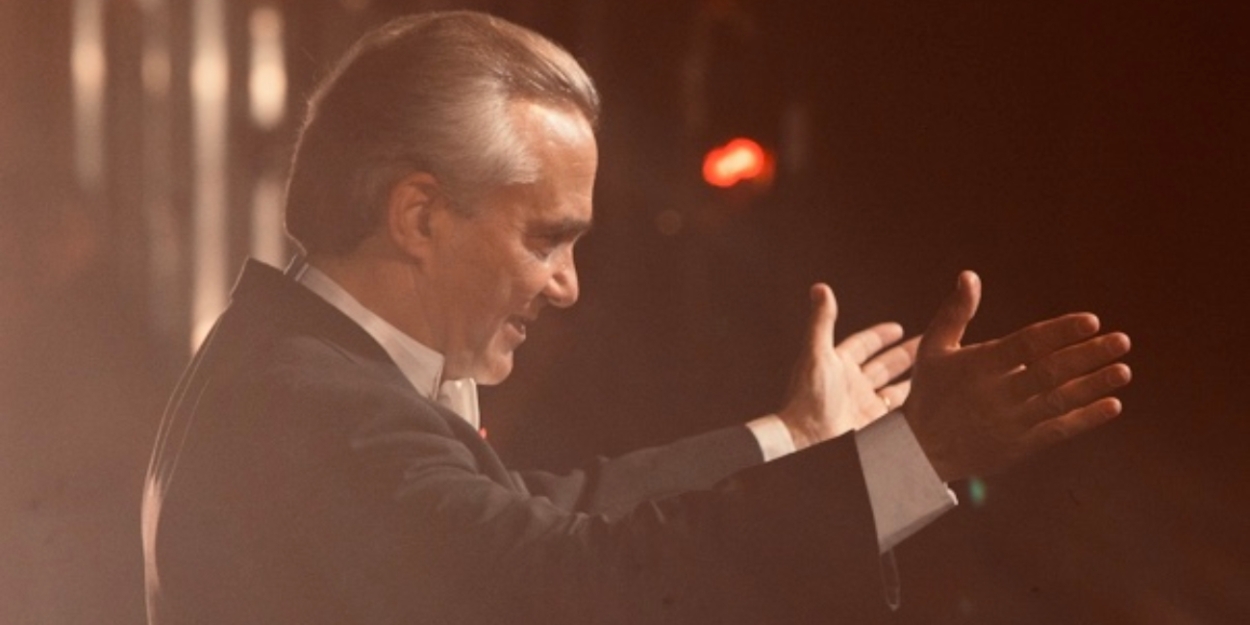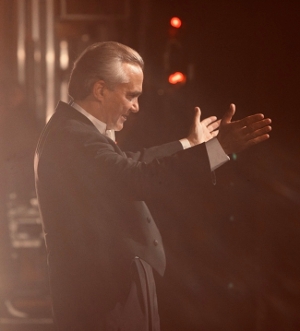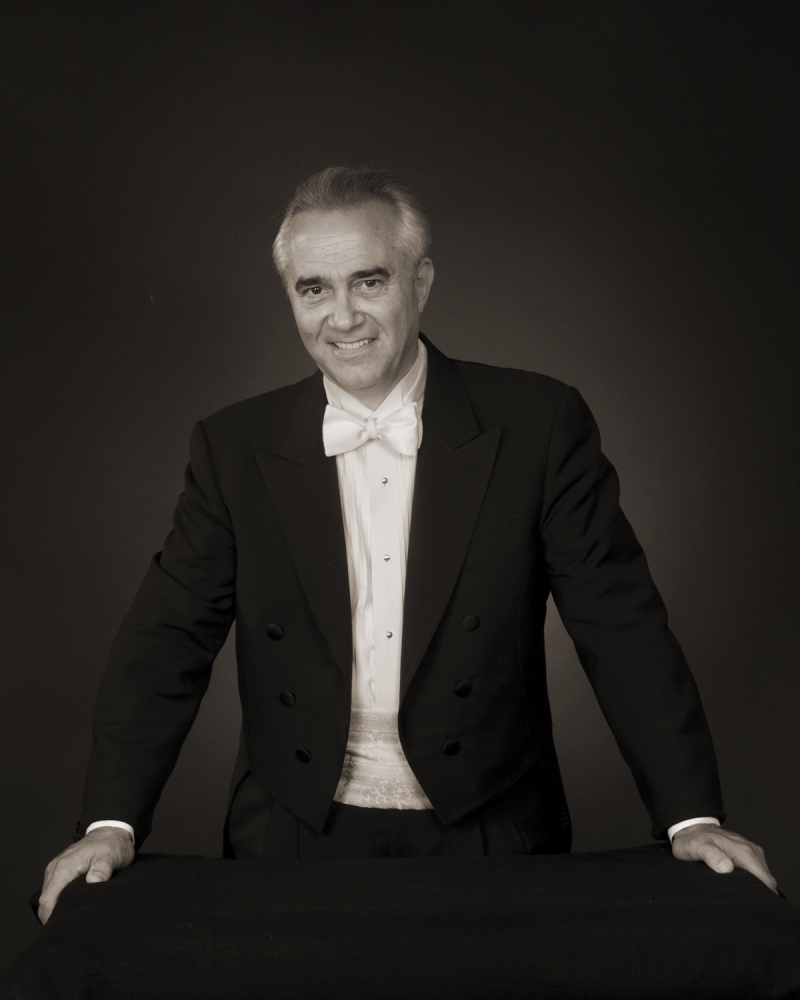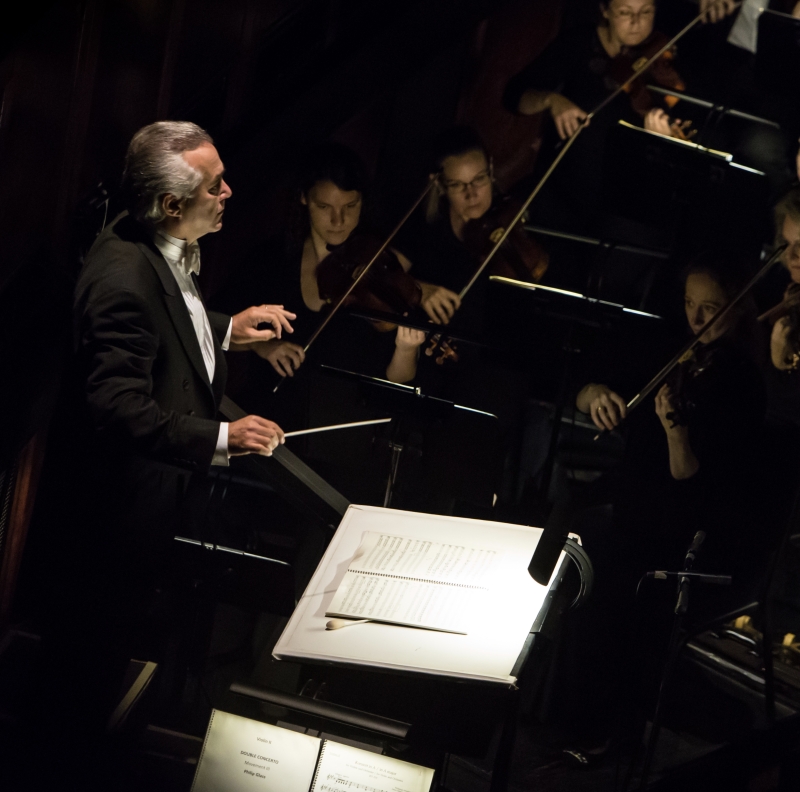Interview: Maestro Ermanno Florio Celebrates His Last Season as Houston Ballet Conductor
After 32 years as Music Director of Houston Ballet, Maestro Ermanno Florio reflects on his journey with Broadway World Houston.


Ermanno Florio
Photo by Amitava Sarkar (2011).
Courtesy of Houston Ballet.
After 32 years as Music Director of Houston Ballet, Ermanno Florio will step down from his position at the end of the 2023 – 2024 season. Since joining Houston Ballet in 1992, Florio has been the Principal Conductor for every production – from the classics of Tchaikovsky, Prokofiev, and Stravinsky to the many world premieres by Artistic Director Stanton Welch AM and other world-renowned contemporary choreographers. BroadwayWorld Houston had the chance and honor to speak with him about what led him to the Houston Ballet, what he has learned in his many years of being the music director for the Houston Ballet, and his plans for the future as he retires from his current position.
To start us off, Ermanno, can you tell us your background? What brought you to conducting? Were you always looking to conduct for a ballet company?

Ermanno Florio
Photo by Kaye Marvins Photography Inc. (2015).
Courtesy of Houston Ballet.
Well, I started playing violin at the age of nine and pretty much went through the whole music conservatory university system in Toronto, Canada, and in my final year, Sir Andrew Davis took me on as his assistant. I studied to become a conductor, so my training is mostly symphonic as an orchestra conductor, and as far as ballet is concerned, I was studying in Amsterdam. I believe it was the early 80s, and the National Ballet of Canada was Erik Bruhn, who was very famous star that took over the National Ballet of Canada and became the artistic director there. He was starting to make changes to the organization, and they were looking for a music director for the company. So, part of the process in Canada was that they wanted to look at all possible Canadian talent first before they did an international search. So, they got ahold of me because they heard of me. I was with the Toronto Symphony and Andrew at the time, and they asked me to come in and audition. As a student, they paid for all of my expenses. To have expenses paid for to travel back home to visit your family, it was going to be a plus-plus no matter what.
So, they had a three-step process to their audition for music. For the first part, I was conducting the orchestra alone, so the orchestra had input and could be included in the process of recommending who they would prefer. Then, the second step was conducting the dancers in a studio rehearsal, and this would mean conducting the pianist. They give you a certain work to learn, and mine was “The Four Temperaments”, so I studied the choreography and video of it and then conducted the dancers. Then, I was the only candidate that went into the final round, which was a performance in the theater as part of their season. The piece I did was a new work called “Piano Concerto”. That went really well, and Erik Bruhn and his assistant wanted to meet with me. We had a meeting, and he said, “Look…We would like you to be our music director.” I was surprised because I had no training in ballet. I told Erik, “Look, I have to be honest…you know when those ladies turn around, I don’t even know what that’s called!” He basically said, “Look: we know you're extremely talented, and you have the ability to know what dancers require from your audition. It will take you three years to run through the company's repertoire because-- generally-- a company rotates repertoire every three or four years. Then, you will have an idea of what this art form is about.” I will never forget it! He said, “Look, you're young. It’s going to be a challenge, but if things go well, I'll support you 200%. If things go badly, I'll support you 100%.” I thought, well, you know: let's give it a try. I had the responsibility of leading one of the major orchestras in the city in Toronto. I said, yes, so that's how I got into conducting for ballet. I was an unbelievable experience. His ability to communicate, the standards he set…they are still the standards that I work by.
What connected you with the Houston Ballet in 1992?
In 1992, I was guest conducting at Milan. I was conducting a production of “Midsummer Night’s Dream”. It was for Robert De Warren, the director of La Scala ballet. I was guest conducting there, and I met this young talented dancer, Li Cunxin. He was a guest principal in this production, and Li and I hit it off. We got along in rehearsals, and then we liked to go out for dinner after performances. He worked with the Houston Ballet, and he told me that his artistic directors were coming for a week to see some of his performances at the La Scala. He asked me “Why don't we go out and have some dinner?” So, we did! I got to know Ben Stevenson, and he was such a phenomenal conversationalist, and just in speaking with him, we got along. He saw my performance at La Scala, and he asked me if I would come to Houston to guest conduct the following season. So, I left La Scala and came to guest conduct here in Houston, and I really was amazed by the level of dancing and the orchestra. I got along so famously that, after opening night, they asked me, “Would you consider being music director here in Houston?” That’s how I got to Houston via Li, Milan, La Scala, and Ben.
What is your role as the music director of a ballet company? What are your specific responsibilities?
There are two main areas of responsibility, and the actual position I have is Music Director and Principal Conductor. As principal conductor, that's pretty much what the public sees. You conduct all of the performances. The music directorship is the actual administrative management of the music department. The administrative part of the position is something I guess most of the public is unaware of, but it's basically being in the office, planning schedules, planning budgets, and working out guest artists (from guest instrumentalists to conductors).
What do you enjoy about being the music director for specifically ballet companies?
It’s the collaborative part. It’s theatre. You have to know the score really well because you have to communicate your musical intentions to the musicians. When you’re working with musicians that are in Vienna and Berlin and La Scala, it’s a challenge and really exciting. What draws me to Houston is the orchestra. Unlike in Europe, I am not going in and out. This position allowed me to work with one group of people for a long period of time, and what happens in the music-making of being with the same group over a long period of time is that--because you constantly work through your musical concepts and rehearsal day after day, year after year, season after season-- you get to a point where all you have to do is look a certain way, and they know exactly what you want. As opposed to guest conducting somewhere, you have to start from scratch so that they understand what you're trying to get musically. It’s time consuming. However, here with the orchestra in Houston, things in rehearsals go very quickly. They understand what I want pretty much during the first read-through, and then it's a matter of just touching a few things up. What I really love about the orchestra here is that they are extremely committed and proud of the music that they make. It almost feels as if-- even though it's a big orchestra-- it feels almost like making chamber music with a small group of people because everyone is so connected with each other.

Ermanno Florio conducting the Houston Ballet Orchestra.
Photo by Christian Brown (2015).
Courtesy of Houston Ballet.
Specifically concerning the ballet, when you add choreography to the music you have established with the orchestra, you run the piece with the dancers. I enjoy working with the dancers and bringing them to the understanding of why you want a certain tempi or a certain liberty with phrasing and music. So, you work with dancers in the studio, and it's a collaborative effect that is also exciting. When you get into the theater and you get to performances after dress rehearsals, there is a magical moment when everyone is so on the music and the choreography. The experience transcends what you’ve been wanting to do in rehearsals. There are magical moments, and I think that's what all performers live for. These moments may only happen half a dozen times in a whole year, but the point of going back in rehearsals and doing things over and over and over again is to get to those levels and times in performance when everything clicks and the performance moves into another stratosphere. I think those special moments are what audiences pick up on even though they may not know or understand music or choreography. It’s something they instinctively feel, and it's what makes live performance live performance.
When do you typically join the rehearsal process? Do you rehearse the music and the dancers respond to you, or do you typically learn the music and join the dancers later in the process?
It depends on the work. If it’s a pre-existing work, like a “Swan Lake” or “Sleeping Beauty”, there are previous performances of that work and the choreography, so you study the score. You have a look at the choreographic version. Even if are doing a more modern version of a classic piece like “Swan Lake”, when you look at the original choreography, you see that modern versions of the original choreography keep most of the important steps but vary. The dancers start rehearsals in the studio 2 1/2 months before I come in, so I make sure that the pianists who are playing in the rehearsal know what the tempo is going to be and what I am hoping for so when they are rehearsing, it’s accurate. The first week of rehearsals go slowly, so the person leading the rehearsal may ask for the music to be a bit slower than normal so that the dancers can learn the steps. The danger in not providing dancers with the final tempi is that--because it starts off slow-- sometimes they never pick it back up to speed, and then you have issues in studio rehearsals before the dress rehearsal. So I make sure that my principal pianist-- Katherine Burkwall-Ciscon-- knows all the tempi that I'm going to do, she meets with the pianists who are going to be playing the rehearsals, and then she goes over the score with them. They put metronome markings in their score, and then they start the rehearsal process. I come into studio rehearsals about a week and a half-two weeks before my first orchestra rehearsal so that I try to see where the company is at with the work, and I start slowly adjusting the tempi if the tempi aren't exactly where I had thought they would be or where they should be. So, over the course of a week, I work with them and make these minor adjustments. Then, based on the last rehearsal with the dancers in the studio, I go into my orchestra rehearsal, and that's where I rehearse and set the tempi based on the run-through in the studios with the dancers. I have three rehearsals with the orchestra, and then we have two piano technical rehearsals on stage with the dancers, which are where the piano plays through the whole score with the dancers. Then, we have two dress rehearsals for the orchestra. After that, we open!
So, that is pretty much the process with pre-existing work. With a brand-new work, commission is pretty much the same process as far as how the studio runs to the opening, but before then, we're dealing with a new work that a composer has created, and the choreographer is in the studio and making changes to the music and asking, “Can we add 8 bars here? Can we cut this section? Can we do this? Can we do that?” So, it takes a lot more time and organization. For example, for “Delmira”-- which is the new ballet we're doing in our next program-- the composer sent us small orchestra versions of the score at the beginning of June, and Katherine made an arrangement that expanded it for a larger chamber orchestra. So, she was responsible for arranging the music, and she's also the principal pianist. She was in the studios when the choreographer was rehearsing, and when the choreographer asked for things to be changed, Kathy would make notes, go to the library, and re-edit the orchestra parts. So-- for world premieres-- there is a lot of initial work that goes into getting the music to the final version before we start rehearsals with the orchestra.
Your resume is so impressive! You have been around the world, constantly maintaining a busy schedule of directing professional ballet companies. Why do you pursue such an international role? What is your favorite aspect about this ever-traveling career?
Understanding people and understanding cultures I've been traveling to has been a joy. I went on my first bus tour when I was 8 or 9. I played in a string orchestra, and I'll always remember it because I had never really been away from home. We did a small tour from Toronto to a small town called London, Ontario. It must have been a two-hour bus trip, but I'll always remember the excitement of getting on the bus and traveling to a different place. I thought it was really cool that they gave us free box lunches! We did a performance, watched the audience’s reaction, got back on the bus, went home, and I thought that this journey of looking at the countryside was so interesting. I had never been away from home alone at nine years old, so it was wonderful seeing all of these places and doing it with a group of musicians my age. The small youth orchestra I was with was made up of a bunch of musicians, and in meeting other musicians, you get to discover their lives, how they do things, and then you have a different a way of judging your environment relative to another young person's environment. It makes you question how and why we do things this way.
Long story short-- 30 years later-- I'm doing the same thing but on a much grander scale when I traveled to Tokyo, when I traveled to Vienna, when I traveled to Paris, and when I traveled to Italy to work with all of these different orchestras. What I do is pretty much the same everywhere, but the challenge is in communicating what you want in different languages to people who do the same thing you do in other cultures. You can't talk to, plan for, or treat an Italian orchestra like you would an English orchestra or a Japanese orchestra. You have to know their culture, and you have to adapt. You try to learn their languages as much as you can, as well. So, there is discovery. I guess that I have always loved to discover new things. I remember the first time I went to study in Tokyo in 1977—that was before Japan became incorporated and before they started exporting cars, computers, and all that—I got to discover this special kind of Japanese food called sushi. I thought that it was absolutely unbelievable. To taste it in Tokyo was extra special. Japan had not opened up economically the way it is now, so it was just phenomenal to discover while walking down the street. There were housewives in traditional Japanese clothing opening up the sliding glass doors to see the stranger walking by because they had never seen a westerner walking down the street. This excitement of discovering cultures and working with different orchestras and dancers in these various cities is so fun, and what I have found is that people are the same everywhere. They all want the same things for themselves artistically. They all want the same things for their families. They all want the same things for their kids. When people disagree with this idea due to politics or other forms of division, I just don’t accept it. To understand others, you just have to take the time to understand their culture and history first. Then, you understand why they do certain things and the way they do it. Music is the language that-- for me-- has allowed me to travel. It was my passport to all these various countries and all these various cultures. I was able to do what I did because of music, and looking back, I think it's enriched my life enormously in the sense that you understand things better when you try to understand why people do things differently than you. Traveling and doing what I do are what I think I wanted to do from the very early age…to see the world, to discover, and to serve.
After so many years of working in this position, how did you grow as a musician, conductor, and overall artist? Did you develop your practice over time?
Ermanno Florio in rehearsals with the Houston Ballet Orchestra.
Photo by Amitava Sarkar (2016).
Courtesy of Houston Ballet.
When you're young, you're overly preoccupied with the technique of what you do. You want to be precise, and you want to be clear. With experience, you learn to prioritize. You learn what's really important to focus on and what you can let slide because it'll take care of itself when you're rehearsing an orchestra. For example, you start a rehearsal, you play through whatever movement, and certain things are not perfect, but you have to know after you rehearse 5 minutes worth of music where you're going to go back to and what you're going to focus on because if you really wanted to get things perfect, you could easily take up a whole rehearsal just fixing a small section of music. When you prioritize what you want to go through, you pick the two or three things that you need to fix, and you have to trust the musicians that they will fix everything else. An orchestra doesn't want to be told what's obvious to everyone. If someone misplays a note by accident—for example-- to go back and say you misplayed that note is a waste of time. I mean, everyone heard it, and everyone knows that. You can perhaps take at small glance at the musician, and then you move on, but you don't harp on it. It’s going to take care of itself, whereas certain things need attention. For example, two instrument groups that play things across the pit but who cannot hear each other depend on the conductor to keep certain things together. As the conductor, you have to stop and say, “Look: this is not together for this reason. Try playing it like this.” Then, you rehearse it, you fix it, and you move on. So, with experience, you go from this kind of active concern about the technique to a more Zen approach to rehearsals. I find that—at a certain level-- the less you do, the better the performance becomes. Especially with my orchestra here in Houston, I find I do not have to do much because we've worked so long together. I just have to give a glance or a certain small movement, and they know exactly what's intended. Sometimes, I try to do very minimal gestures to see if everyone's listening to each other, and when that happens without much energy from the conductor, it's magic because it means that everyone is so in-sync with each other.
I see that you will continuing your career as an international conductor. What are your hopes for the road ahead? What will you be pursuing?
Right now, I explained to you earlier that a music director has two different aspects of the job; there is the actual conducting as principal conductor and then there's the music director’s position. What I really would like to give up is the administrative side of it. All I want to do is make music going forward, and so I'm going to Amsterdam in October to conduct there. I may come back and do some guests with the company here, as well. It’s the administrative side of the position that that I'm trying to step down from, not the principal conductor performing side of it.
After so many years with the Houston Ballet, what was your favorite moment/what were your favorite moments of working with this company?
There just so many… I mean, musically, one of the highlights for me was the performance of “The Rite of Spring” just because it is such an unbelievable piece, and to have almost 100 musicians crammed into the pit and making that glorious sound, that was I think one of the musical highlights. Another was arranging the music for “Marie” by Shostakovich. It was fun helping the dancers understand what they were trying to do with the music.
I think in my 30 years here, I must have seen I'd say close to three generations of dancers come through the company because their careers are not very long. So, it was interesting to see the original group of dancers with Li and all of the group that I came into. What's really interesting is that each generation carries their own value system for how they work and what they do. To see each group change every 10 or so years was exciting because everything changed. The smartphone and everything with technology certainly changed dancers. “Romeo and Juliet” was also wonderful. But the greatest thing that I take away is the orchestra. It’s amazing to remember and see how much the orchestra has come along over the past 30 years. I remember the orchestra when I started, and I know how great they play now. There is a stronger sense of togetherness. They're committed to each other, and they play with conviction. The growth is gratifying to see, which is different than guest-conducting. Seeing the result of your work over a long period of time is great. I think that the orchestra is pretty much my greatest jewel in the crown.
To finish us off, is there anything else you would like to share with the readers of BroadwayWorld Houston?
I think that that we are really fortunate to have such a committed public for the performing arts and for ballet specifically, and I want to say that that we have one of the greatest boards and executives that support the company. I think other companies in this country and definitely in Europe would give anything to have such a committed community that is so dedicated to its success. It was great to see the support that we had, especially during COVID because I never ever want to go back to the initial months of the pandemic. However, the board was so supportive. They came forward and basically said, “Whatever you need to keep the company going, we're there for you.” All in all, the level of commitment that the community, the board, the musicians, the dancers, and the artists have alongside the pride that they take in the arts is absolutely wonderful. It’s special, and I believe it should be recognized and cherished.
Comments
Videos

